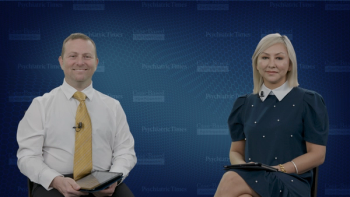Linda Trinh, DNP, MPH, FNP-C, PMHNP-BC
Articles by Linda Trinh, DNP, MPH, FNP-C, PMHNP-BC

Future Directions For Prescription Digital Therapeutics
ByGustavo Alva, MD, DFAPA,Erin Crown, MHS, PA-C, Psych-CAQ,Linda Trinh, DNP, MPH, FNP-C, PMHNP-BC Panelists discuss how increasing patient comfort with technology and advances in artificial intelligence (AI) and virtual reality (VR) create opportunities for integrating prescription digital therapeutics (PDTs) into schizophrenia care, while emphasizing the need for clinician education and preserving the human connection.

Talking to Patients about Prescription Digital Therapeutics
ByGustavo Alva, MD, DFAPA,Erin Crown, MHS, PA-C, Psych-CAQ,Linda Trinh, DNP, MPH, FNP-C, PMHNP-BC Panelists discuss patient hesitations toward prescription digital therapeutics (PDTs) for schizophrenia. They highlight concerns about repetitive content and technology mistrust due to symptoms such as paranoia, the significant access barriers related to insurance coverage especially for vulnerable populations, and the critical need for improved clinician education to increase awareness and integration of PDTs into treatment plans.

Long-term Use of Prescription Digital Therapeutics
ByGustavo Alva, MD, DFAPA,Erin Crown, MHS, PA-C, Psych-CAQ,Linda Trinh, DNP, MPH, FNP-C, PMHNP-BC Panelists discuss the flexible use of prescription digital therapeutics (PDTs) in schizophrenia, comparing them with gym workouts that can be used regularly for maintenance or intensified during symptom flare-ups. They highlight PDTs’ role in addressing negative symptoms, supporting sustained improvement, and offering personalized, ongoing care alongside medication.

The Role of Multimodal Care in a Comprehensive Treatment Approach
ByGustavo Alva, MD, DFAPA,Erin Crown, MHS, PA-C, Psych-CAQ,Linda Trinh, DNP, MPH, FNP-C, PMHNP-BC Panelists discuss the critical role of multimodal care in schizophrenia management, emphasizing that prescription digital therapeutics (PDTs) complement but do not replace medications. They highlight the importance of patient education, shared decision-making, and integrating lifestyle habits to support motivation, symptom control, and long-term well-being.

Overview of Ongoing Clinical Trials
ByGustavo Alva, MD, DFAPA,Erin Crown, MHS, PA-C, Psych-CAQ,Linda Trinh, DNP, MPH, FNP-C, PMHNP-BC Panelists discuss ongoing phase 3 studies evaluating prescription digital therapeutics (PDTs) for schizophrenia, focusing on improving negative symptoms such as motivation and pleasure. They highlight how these tools—some incorporating augmented reality—show promise in enhancing self-esteem, reducing defeatist attitudes, and supporting personalized goal setting to boost social functioning and quality of life.

Improving Quality of Life with Prescription Digital Therapeutics
ByGustavo Alva, MD, DFAPA,Erin Crown, MHS, PA-C, Psych-CAQ,Linda Trinh, DNP, MPH, FNP-C, PMHNP-BC Panelists discuss how the CT-155 trial data highlight the importance of a strong digital therapeutic alliance in improving engagement and outcomes for patients with schizophrenia, particularly in addressing negative symptoms such as emotional flatness and social withdrawal that traditional treatments often miss.

An Overview of CT-155
ByGustavo Alva, MD, DFAPA,Erin Crown, MHS, PA-C, Psych-CAQ,Linda Trinh, DNP, MPH, FNP-C, PMHNP-BC Panelists discuss how prescription digital therapeutics (PDTs) such as CT-155 target the challenging negative symptoms of schizophrenia by enhancing motivation, social engagement, and quality of life. They emphasize the role of these tools in overcoming social isolation and supporting patients’ pursuit of meaningful, fulfilling lives alongside traditional treatments.

Discussing an Approved Prescription Digital Therapeutic
ByGustavo Alva, MD, DFAPA,Erin Crown, MHS, PA-C, Psych-CAQ,Linda Trinh, DNP, MPH, FNP-C, PMHNP-BC Panelists discuss the integration of Rejoyn, a smartphone app combining cognitive behavioral therapy with Emotional Faces Memory Tasks, highlighting its efficacy in reducing depressive and anxiety symptoms. They also emphasize the ethical importance of informing patients about prescription digital therapeutics (PDTs) as accessible, adverse-effect–free adjuncts that enhance patient engagement and broaden mental health treatment options.

Clinical and Functional Outcomes With Prescription Digital Therapeutics
ByGustavo Alva, MD, DFAPA,Erin Crown, MHS, PA-C, Psych-CAQ,Linda Trinh, DNP, MPH, FNP-C, PMHNP-BC Panelists discuss the critical role of patient-reported outcomes in evaluating prescription digital therapeutics (PDTs), emphasizing how real-world usage patterns, symptom relief, and improvements in daily functioning inform clinical decisions and complement medication adherence, while sham-controlled studies help rigorously validate the true therapeutic effects of these digital interventions beyond placebo.

A Review of Prescription Digital Therapeutics in Psychiatric Care
ByGustavo Alva, MD, DFAPA,Erin Crown, MHS, PA-C, Psych-CAQ,Linda Trinh, DNP, MPH, FNP-C, PMHNP-BC Panelists discuss various prescription digital therapeutics (PDTs) in clinical use, highlighting their role in overcoming barriers such as limited therapist access by providing convenient, engaging, and tailored interventions—such as cognitive behavioral therapy (CBT) for insomnia and anxiety, cognitive rehabilitation, and on-demand behavioral support—that complement traditional treatments and improve patient adherence and outcomes.

The Role of Prescription Digital Therapeutics
ByGustavo Alva, MD, DFAPA,Erin Crown, MHS, PA-C, Psych-CAQ,Linda Trinh, DNP, MPH, FNP-C, PMHNP-BC Panelists discuss the limitations of traditional antipsychotics and the growing role of prescription digital therapeutics (PDTs) as complementary tools that align with younger patients’ digital habits, enhance engagement between visits, and enable real-time data tracking to improve proactive, personalized schizophrenia care.

The Limitations of Conventional Treatment Approaches
ByGustavo Alva, MD, DFAPA,Erin Crown, MHS, PA-C, Psych-CAQ,Linda Trinh, DNP, MPH, FNP-C, PMHNP-BC Panelists discuss how current schizophrenia care models often fall short due to systemic barriers—ranging from rural access issues to urban resource constraints—and emphasize the need for integrated, scalable approaches that combine pharmacologic treatment with consistent, accessible psychotherapy to address the full spectrum of patient needs.

The Role of Psychotherapy in Schizophrenia Management
ByGustavo Alva, MD, DFAPA,Erin Crown, MHS, PA-C, Psych-CAQ,Linda Trinh, DNP, MPH, FNP-C, PMHNP-BC Panelists discuss the vital but often underutilized role of psychotherapy in schizophrenia treatment, emphasizing the need for accessible, tailored interventions such as cognitive behavioral therapy (CBT) for psychosis to complement medication and address persistent functional and cognitive challenges.

Symptom Domains in Schizophrenia
ByGustavo Alva, MD, DFAPA,Erin Crown, MHS, PA-C, Psych-CAQ,Linda Trinh, DNP, MPH, FNP-C, PMHNP-BC Panelists discuss how prescription digital therapeutics (PDTs) can complement pharmacologic treatments in schizophrenia by addressing persistent negative and cognitive symptoms—such as motivation, social engagement, and executive function—that often go untreated, highlighting the need for a more holistic, patient-centered approach to care.

Panelists discuss how successful implementation of xanomeline/trospium chloride requires understanding its unique mechanism of action, providing proper patient education about dosing requirements, starting with slow titration, and recognizing it as an early treatment option rather than a last resort.

Panelists discuss how best practices involve starting with lower doses in older patients, considering long-term tolerability over acute symptom control, and potentially using xanomeline/trospium chloride as first-line treatment even for treatment-naive patients presenting with acute psychosis.

Panelists discuss how Lila’s late-onset schizophrenia at age 52 raises diagnostic concerns requiring thorough medical workup, and how her response to olanzapine with sedation and shakiness suggests the need for dose reduction or consideration of alternative treatments such as xanomeline/trospium chloride.

Panelists discuss how xanomeline/trospium chloride should be positioned as a first-line treatment option rather than waiting for treatment failures, given its superior effect size, comprehensive symptom coverage, and favorable tolerability profile compared with that of traditional antipsychotics.

Panelists discuss how switching patients to xanomeline/trospium chloride requires different cross-titration strategies depending on whether patients are on “done” medications versus “pines” medications, with special attention to anticholinergic effects when transitioning from sedating antipsychotics.

Panelists discuss how real-world experience with xanomeline/trospium chloride shows efficacy across all 3 symptom domains with manageable gastrointestinal adverse effects that typically resolve within 2 weeks, requiring slow titration and patient education about empty stomach dosing.

Panelists discuss how xanomeline/trospium chloride represents a first-in-class medication with a novel muscarinic mechanism that addresses positive, negative, and cognitive symptoms while avoiding typical antipsychotic adverse effects such as movement disorders and prolactin elevation.

Panelists discuss how Jacob’s case demonstrates the importance of recognizing negative symptoms that preceded positive symptoms by nearly a year, and how a partial response to risperidone with continued breakthrough symptoms and cognitive “fogginess” indicates the need for treatment optimization.

Panelists discuss how clinicians can better identify subtle and unreported schizophrenia symptoms through systematic evaluation of positive symptoms, negative symptoms, cognitive deficits, and functional impairment, which often requires input from family members and caregivers.


